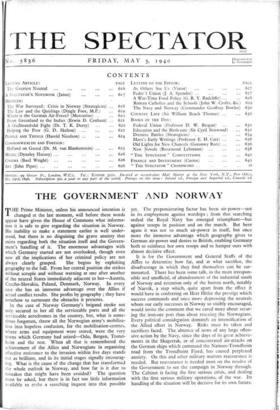THE GOVERNMENT AND NORWAY
THE Prime Minister, unless his announced intention is I changed at the last moment, will before these words appear have given the House of Commons what informa- tion it is safe to give regarding the situation in Norway. His inability to make a statement earlier is well under- stood, but there is no disguising the grave anxiety that exists regarding both the situation itself and the Govern- ment's handling of it. The enormous advantages with which Germany started are not overlooked, though even now all the implications of her criminal policy are not always clearly grasped. She begins by exploiting geography to the full. From her central position she strikes without scruple and without warning at one after another of the neutral States immediately adjacent to her—Austria, Czecho-Slovakia, Poland, Denmark, Norway. In every case she has an immense advantage over the Allies if actual conflict results. She profits by geography ; they have somehow to surmount the obstacles it presents.
In the case of Norway Germany's brigand stroke not only secured to her all the serviceable ports and all the serviceable aerodromes in the country, but, what is some- times forgotten, threw all the Norwegian army's mobilisa- tion into hopeless confusion, for the mobilisation-centres, where arms and equipment were stored, were the very towns which Germany had seized—Oslo, Bergen, Trond- heim and the rest. When all that is remembered the achievement of the Allies and Norwegians in organising effective resistance to the invasion within five days stands out as brilliant, and in its initial stages signally encourag- ing. What is the cause of the change that has transformed the whole outlook in Norway, and how far is it due to mistakes that might have been avoided? The question must be asked, but there is in fact too little information available to mike a searching inquest into that possible yet. The preponderating factor has been air-power—not in its employment against warships ; from that searching ordeal the Royal Navy has emerged triumphant—but against troops in position and on the march. But here again it was not so much air-power in itself, but once more the immense advantage which geography gives to German air-power and denies to British, enabling Germany both to reinforce her own troops and to hamper ours with almost decisive effect.
It is for the Government and General Staffs of the Allies to determine how far, and at what sacrifice, the disadvantage in which they find themselves can be sur- mounted. There has been some talk, in the main irrespon- sible and unofficial, of abandonment of the industrial south of Norway and retention only of the barren north, notably of Narvik, a step which, quite apart from the effect it would have in conferring on Herr Hitler the prestige which success commands and once more depressing the neutrals whom our early successes in Norway so visibly encouraged, would invite the comment that we cared more about secur- ing the iron-ore port than about rescuing the Norwegians. Every political consideiation demands an intensification of the Allied effort in Norway. Risks must be taken and sacrifices faced. The absence of news of any large offen- sive action by the Navy, since the days of its great achieve- ments in the Skagerrak, or of concentrated air-attacks on the German ships which command the Namsos-Trondheim road from the Trondheim Fjord, has caused perplexed anxiety. On this and other military matters reassurance is needed. But reassurance is heeded most on the resolve of the Government to see the campaign in Norway through. The Cabinet is facing the first serious crisis, and dealing with the first serious military operations, of the war. Its handling of the situation will be decisive for its own future.


































